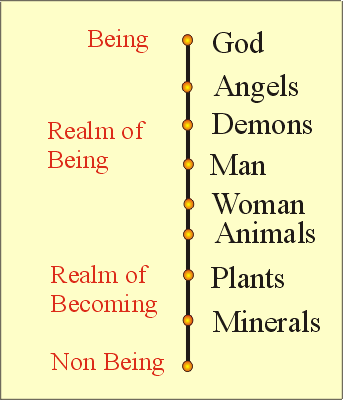The Great Chain of Being states that the reason why you are a peasant, and even as important, why you should not try to be anything other than a peasant, is because the peasant station in life is where God put you. The entire universe was depicted as a great pyramid, with God at the top, below God are the Angels, below the Angels, etc. Medieval thought held that once placed in a particular level in that pyramid, a being should be satisfied to stay on that level. The story of Lucifer, one of God’s perfect angels, leading a rebellion against his Master is the primordial lesson about over-reaching. God wins the war and tells Lucifer, now Satan, to, well, go to Hell. The serpent in the Garden of Eden tempts Eve with superior knowledge.
We can extract one level, that of Mankind, and create another Great Chain of Being flow chart with the King at the top. The clergy and the noblemen were in constant conflict about who belonged on the second tier, the clergy claiming they were closer to heaven because of their religious status and the noblemen arguing birthright. Peasants are on the bottom tier. During the Renaissance, another tier evolved as the middle class formed. Merchants bought their way into nobility by offering cash to money starved nobles who were willing to marry their daughters to more plebian individuals in order to offset their wanton spending.
We can apply that Great Chain of Being pyramidical structure to the family. Father is at the top followed by the eldest son. Upon the father’s death, the Eldest Son inherited the estate and became a gentleman farmer like dad. The other sons had to fend for themselves, usually by entering the military or ministry. That is why even a notably successful general is not at the top of the heap at social gatherings. He may be a general, but he is not the eldest son. Mom, the widow, lives perhaps on a stipend and on the monetary mercy of the eldest son. Daughters, hopefully well sought after daughters, are dowry chips.
The Great Chain of Being also made sense in the middle ages in terms of life spans. If the average peasant lived to 35, if lucky, then why spend so much time in being successful in this life (moving up) when compared to eternity. Spend more time on prayer than in building a better mousetrap.
One of the explorable themes of William Shakespeare’s work involves the consequences of violating the Great Chain of Being. Brutus oversteps his boundaries by assassinating Julius Caesar and likewise Macbeth when he kills the king. Notice that all of nature is in rebellion when these murderous acts occur. Horses eat each other, rabbits chase hawks, earthquakes and “fearful nights” all occur because in committing those deeds, Brutus and Macbeth have upset the apple cart. Othello and Desdemona violate the Great Chain of Being by marrying outside their class (General and Woman of Nobility) and race. Cassio consorts with prostitutes. Hamlet’s uncle assassinates the king, Hamlet takes the law into his own hands, Lear’s daughters overreach, etc. Modern day teenagers would have a hard time swallowing this, but Romeo and Juliet also violate the Great Chain of Being by eloping without their parents’ consent. In short, if you violate the Great Chain of Being, you must pay.


No comments:
Post a Comment
Please add your comment. All feedback welcome!